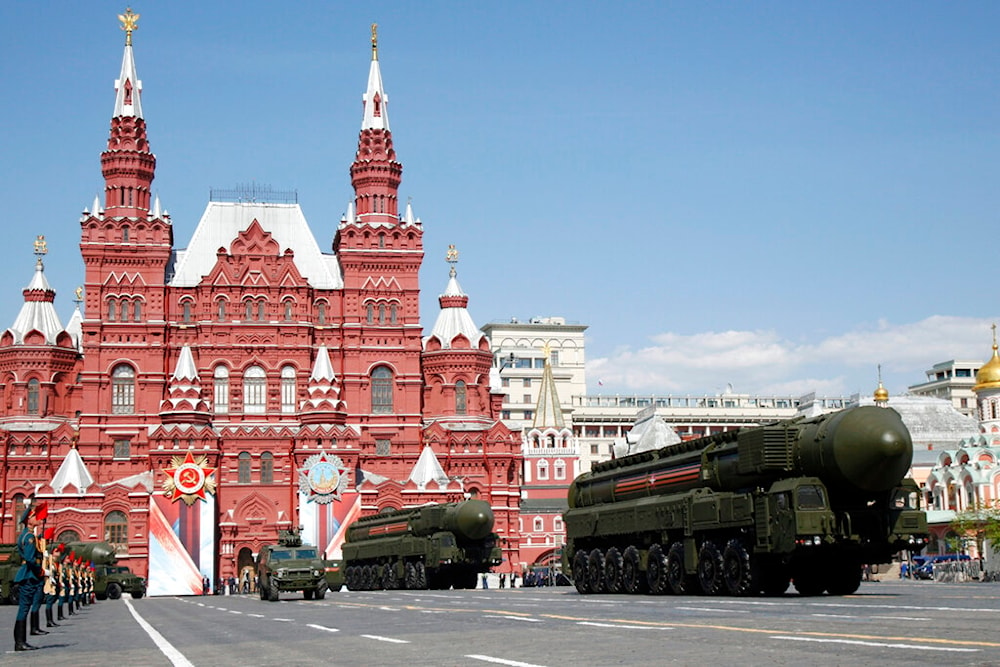Russia must update nuclear doctrine to bolster deterrence: Ex-advisor
A former Kremlin adviser underlines that Russia needs to update its nuclear doctrine as the current one is "woefully outdated".
-

Russian ICBM missile launchers move during the Victory Day military parade marking 71 years after the victory in WWII in Red Square in Moscow, Russia, May 9, 2016. (AP)
Former Kremlin advisor Sergey Karaganov has urged Russia to revise its nuclear doctrine, advocating for a more aggressive stance that includes the possibility of a nuclear response to any major military aggression.
Karaganov, a former foreign policy advisor to the Russian presidential administration, spoke to Kommersant on Wednesday, calling the current policy outdated and insufficient as a deterrent.
Russia's nuclear doctrine, adopted in 2020, permits the use of nuclear weapons but only in "exceptional cases" when the country's sovereignty and territorial integrity are under threat.
The doctrine clearly stipulates that pre-emptive nuclear strikes are prohibited. Karaganov underlined that this approach effectively stripped Russia's military and foreign policy from nuclear deterrence.
"We have allowed the situation to deteriorate to a point where our adversaries believe we will not use nuclear weapons under any circumstances," Karaganov said. He warned that a failure to strengthen nuclear deterrence could lead to a series of wars that might escalate into World War III within a few years.
Such a failure "would plunge the world into a series of wars that would inevitably turn nuclear and end up with the World War III," he said.
Large-scale attack on Russia enough to warrant nuclear response
Karaganov insists that Russia should declare any large-scale attack on its territory as justification for a nuclear response, stressing the need for clear "nuclear escalation" steps in the next doctrine. This, he believes, would eliminate any doubts about Russia's readiness to use its nuclear arsenal.
"It's high time we stated that any massive strikes against our territory give us a right to respond with a nuclear strike," Karaganov insists. He also called on Moscow to clearly define the "nuclear escalation" steps in the next doctrine to leave no room for doubt that Russia is prepared to use its nuclear arsenal.
The call for a more assertive nuclear stance comes as Ukraine continues its military incursions into Russia's Kursk Region, with Kiev seeking permission from Western allies to deploy long-range missiles for strikes deep within Russian territory.
Despite Karaganov's recommendations, President Vladimir Putin has maintained a more cautious approach.
Speaking at the St. Petersburg International Economic Forum in June, Putin emphasized that Russia is "not brandishing" its nuclear weapons and expressed hope that a nuclear exchange with the West would never occur.
While Putin has not ruled out changes to the doctrine, he has indicated that Russia currently has no reason to consider using nuclear weapons, stating that any retaliatory strike would guarantee the enemy's destruction.
As tensions persist, the debate over Russia's nuclear policy continues to reflect broader concerns about global security and the risks of escalation in military conflicts.
Updates incoming?
Russian Deputy Foreign Minister Sergey Ryabkov had said earlier this month that Russia was set to revise its nuclear doctrine in response to an analysis of recent conflicts and the actions of Western nations regarding the ongoing Ukraine war.
"As we have repeatedly said before, the work is in the advanced stage, and there is a clear intent to introduce a correction [to the nuclear doctrine], caused, among other things, by the examination and analysis of development of recent conflicts, including, of course, everything connected to our Western adversaries’ escalation course in regards to the special military operation," Ryabkov told Russia's state-owned news agency TASS.
He pointed out that while the relevant document is nearing completion, it is too early to specify a timeframe for its finalization.
"The timeframe for its completion is a rather complicated issue, considering that we are talking about the most important aspect of our national security," the Russian diplomat added.

 4 Min Read
4 Min Read









